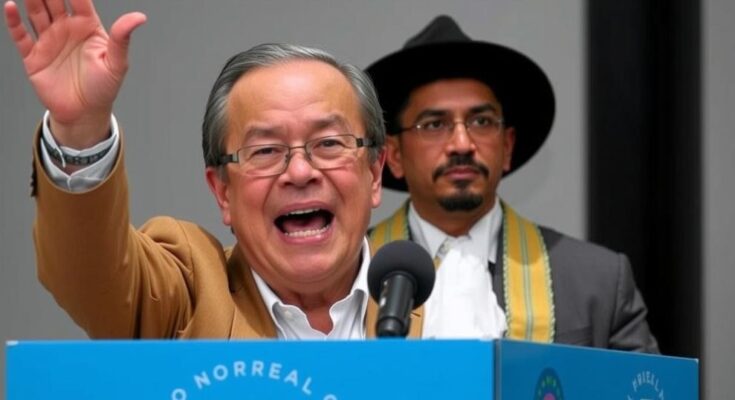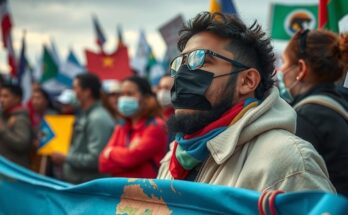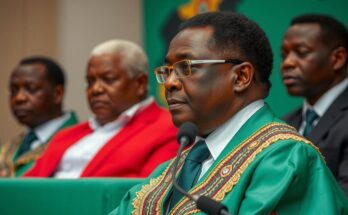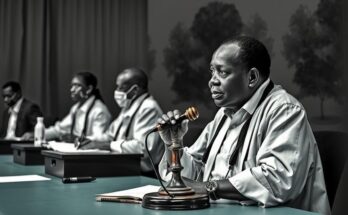Bolivia prepares for another contentious judicial election amidst public disillusionment and political maneuvering. With only a partial election occurring, concerns over the legitimacy of the process and the politicization of judicial appointments have led many voters to express apathy towards participation. The electoral framework has been criticized for undermining judicial independence, with significant implications for Bolivia’s democratic process and governance.
Bolivia is set to conduct a divisive popular vote for its top judges this Sunday, despite a prohibition on official campaigning. In La Paz, candidates have covertly promoted themselves through unusual means, such as branding snacks and embedding slogans in official voting materials, highlighting the unfamiliarity of voters with the extensive list of candidates on the ballots. Bolivia remains unique in holding elections for its judicial positions, with Mexico preparing to adopt a similar system following reforms initiated by former President Andres Manuel Lopez Obrador amid widespread protests.
The shift to a system of judicial elections in Bolivia, implemented over a decade ago, has drawn scrutiny and skepticism, particularly as the electorate engages with a process perceived as more politically motivated than judicially sound. Many Bolivians express apathy towards the election, questioning its legitimacy and fearing that it merely serves to empower political factions rather than uphold justice. “I’ll flip a coin,” remarked architecture student Marisol Nogales regarding her voting strategy, exemplifying the disillusionment among voters.
Critics, including legal experts, argue that the election of judges undermines judicial independence and reinforces the prevailing political power structures. Francisco Vargas, vice president of Bolivia’s electoral tribunal, acknowledged the contentious nature of the electoral process, noting its increasing complexity and litigative tendencies, distancing it from the original intent of a straightforward democratic election.
This judicial election was initially scheduled for late 2023 but was postponed due to interventions by the Constitutional Court. This delay raised concerns about deepening political power struggles, notably between President Luis Arce and former President Evo Morales, influencing the judiciary’s integrity. As stated by Ivan Lima, former Minister of Justice, such disorder has the potential to precipitate further conflict in an already divided political landscape.
The Inter-American Court of Human Rights has criticized the election postponement, emphasizing its detrimental consequences for Bolivia’s justice system. The upcoming election is a partial one, with only four out of nine seats being contested, leaving the majority of judges in their positions. As political analyst Paul Coca noted, the judges have effectively transformed the Constitutional Court into an influential ‘superpower’.
This marks the third instance of judicial elections in Bolivia, following two previous elections under Morales, both of which resulted in historically low voter turnout due to public dismay over the perceived lack of transparency and the selection process. Morales’ attempts to secure a fourth term, met with significant public resistance in a referendum, underscored the contentious relationship between judiciary independence and political ambition. The events leading to his resignation in 2019 continue to influence the political climate as Bolivians navigate the complexities of their electoral system.
With President Claudia Sheinbaum of Mexico monitoring these developments closely, Bolivia’s situation serves as a pivotal case study for judicial processes and political dynamics in Latin America, particularly regarding the ongoing discussions around electoral integrity and the role of power in shaping judicial independence.
Bolivia is distinguished as the only nation globally that holds elections for its highest judicial positions. The recent electoral changes stem from both social unrest and political maneuvering, as exemplified by former President Evo Morales and current President Luis Arce, who have leveraged judicial appointments to secure their political agendas. The transition from a merit-based nomination system to popular elections for judges brought about profound concerns over judicial impartiality, with numerous commentators warning that political affiliations may hinder the judiciary’s independence and efficiency. With the introduction of judicial elections in 2011 and 2017, the reception among Bolivians has been marked by skepticism, driven by perceived opacity and politicization of the judicial appointments. This historical context is crucial in understanding the current atmosphere surrounding the upcoming elections.
The approaching judicial elections in Bolivia highlight deep-rooted tensions within the political system and the judiciary. With a unique model that intertwines judicial appointments with electoral politics, the consequences of these elections are not merely procedural; they affect the very foundation of democracy and governance in Bolivia. As the nation prepares for the vote amidst widespread disillusionment, the implications for judicial integrity and political stability remain critical points of concern, particularly in light of regional trends in Latin America.
Original Source: www.voanews.com




